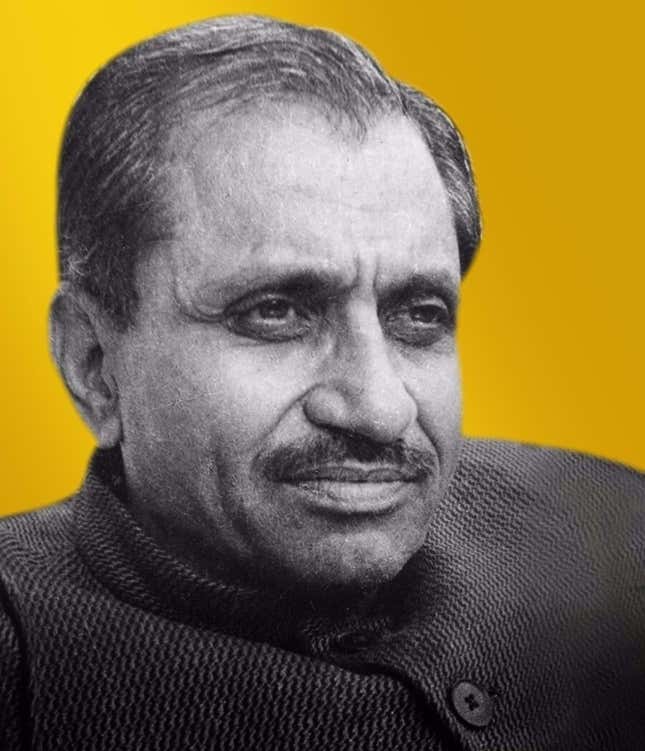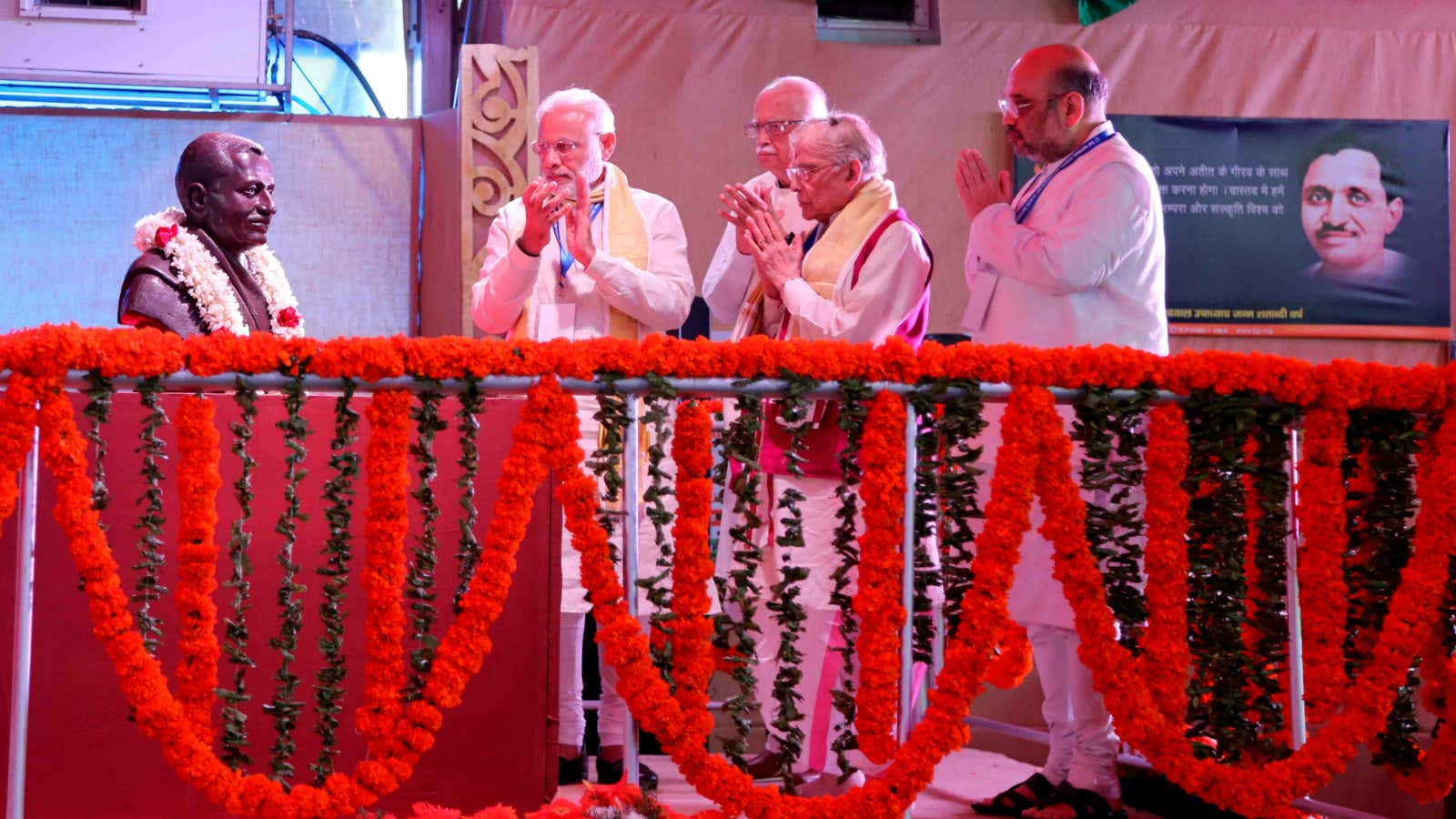For over two years, India’s ruling dispensation has harped on his name.
From the many government schemes named after him to celebrating his 100th birth anniversary, the Narendra Modi-led Bharatiya Janata Party (BJP) government has tried hard to remind Indians of the life and work of Deendayal Upadhyaya.
Yet, the former general secretary of the Bharatiya Jana Sangh (BJS), the BJP’s predecessor, remains unfamiliar among most Indians.
In fact, even within the BJP, he is often overshadowed by other stalwarts, such as Syama Prasad Mookerjee, Atal Bihari Vajpayee, and Lal Krishna Advani. So much so that at the party’s national council meet held last September in Kerala, a photo of Upadhyaya’s was erroneously titled Rajnath Singh, the name of the Indian home minister. And this at an exhibition on Upadhyaya himself. Embarrassed party functionaries quickly made amends, but the damage was done.
Nevertheless, Modi has for some time been looking to revive Upadhyay’s legacy. An obvious admirer, the prime minister has been carefully scripting a narrative around the late leader.
“Pandit Deendayal Upadhyaya is our inspiration,” Modi wrote in September 2015. ”From his life, we learn how an individual completely devoted himself to the well-being of the nation and the service of the poor. As a political organiser, his work was legendary. Without getting trapped in the lure for power he continued to work, selflessly.”
On Dec. 31, 2016, as millions tuned in to watch him speak, Modi, among other things, said, ”India is celebrating the centenary of Pandit Deendayal Upadhyaya as Garib Kalyan Varsh (year of the welfare of the poor).”
Earlier, Modi had named him among the three greatest thinkers of the past century, along with Mahatma Gandhi and Indian freedom fighter and socialist leader Ram Manohar Lohia.
Meanwhile, his government has earmarked Rs100 crore for Upadhyaya’s centenary celebrations, of which 80% would be towards creating infrastructure. All this besides the multiple initiatives named after him, such as the rural electrification scheme and the several skill-development programmes of the central government.
So who exactly was Upadhyaya and what is his legacy? Why are the BJP and Modi highlighting him though he found little electoral success during his lifetime and even lesser mention in modern Indian history?
Life & times

Upadhyaya was born in 1916 to Bhagwati Prasad and Rampyari. There is some uncertainty about where, though.
The government’s press information bureau (PIB) says it was in Dhankia, a small village (pdf) in the western Indian state of Rajasthan. However, the BJP’s official website and the Dr. Syama Prasad Mookerjee Research Foundation, which runs a website dedicated to him, say he was born near Mathura in the United Provinces (now Uttar Pradesh or UP). This confusion underlines how little is known of a man whose legacy Modi is trying to revive.
Brought up by his maternal uncle following his parents’ death during his early childhood, Upadhyaya was a bright student. He completed his intermediate—the equivalent for class XII—in 1937 from the Birla College in Pilani, Rajasthan, which later become the prestigious Birla Institute of Technology and Science (BITS). The same year, he joined the Hindu nationalist Rashtriya Swayamsevak Sangh (RSS) at the instance of his friend Balwant Mahashabde. He became a full-time RSS functionary in 1942, five years before India’s independence, although he was qualified to be a teacher.
Between 1940 and 1950, Upadhyaya founded many journals for the RSS, such as the weekly newspaper Rashtra Dharma, the organisation’s mouthpiece Panchajanya, and the daily Swadesh.
In 1951, when Mookerjee founded the BJS, Upadhyaya became its general secretary. Mookerjee died in 1953 under mysterious circumstances in police custody, leaving the BJS in the hands of Upadhyaya. He remained general secretary for 15 years before being elected president in 1968. He had been president for just 43 days when he, too, was found dead due to causes that are still unexplained.
The BJP’s official website and the Dr. Syama Prasad Mookerjee Research Foundation claim Upadhyaya died on Feb. 11, 1968, at the Mughalsarai railway station in UP, while the government claims it was on Feb. 01, 1968.
Probing his death, India’s Central Bureau of Investigation (CBI) concluded that the BJS president was pushed out of a train by two robbers. The accused duo was, however, acquitted for want of evidence. Many, including prominent BJP leaders Subramanian Swamy, Nanaji Deshmukh, and Dattopant Thengadi, later dismissed the CBI’s findings. According to the Syama Prasad Mookerjee Foundation, Upadhyaya’s dead body remained unattended for many hours until someone in the crowd identified it.
Since his death, the BJS has evolved into the BJP and has formed governments multiple times, including since 2014 under Modi when India got its first ever full-majority government in nearly 30 years.
Ideological fountainhead
While Upadhyaya was admired for his organisational skills, he was also a thinker and philosopher, credited with laying the BJS’s ideological foundations.
He is credited with propounding the doctrine of integral humanism which puts the human being at the centre of development and looks to provide a minimum standard of living to every individual. This doctrine lies at the core of the BJP’s worldview. It is “a synthesis of the material and the spiritual, the individual and the collective,” the government said in a statement last year (pdf).
The ideology also advocates the use of natural resources at a rate at which they can be replenished.
“In the field of politics and economics, he was pragmatic and down to earth. He visualised for India a decentralised polity and self-reliant economy with the village as the base,” the government statement said.
While some historians have pointed at the divergence of Upadhyaya’s philosophy from that of other Hindu nationalists, the BJP has always fiercely defended its ownership of integral humanism. “The mantra of integral humanism that was given by Deendayal ji remains a guiding force for all of us,” Modi said in 2014.
However, writing for Scroll.in, journalist and author Ajaz Ashraf argued that, “… a reading of the four lectures Upadhyaya delivered on integral humanism in Mumbai between April 22 and April 25, 1965, shows he dressed popular prejudices, unfounded assertions and ideas, neither novel nor uniquely his, in the cloak of what he calls the Bharatiya culture. Worryingly, integral humanism challenges the supremacy of the Indian constitution and can be invoked to justify its violation.”
Upadhyaya was also quite critical of the alleged anti-national attitude of India’s Muslims, particularly of their role in obstructing his vision of an Akhand Bharat (undivided India). “The creation of Pakistan is the triumph of this attitude. Those who have doubts about Akhand Bharat feel that the Muslim will not change his policy. If this is so, then the continuance of six crore Muslims in India would be highly detrimental to the interest of India,” he said.
Nevertheless, after a lull of decades, Upadhyaya may slowly be re-emerging in public consciousness.
